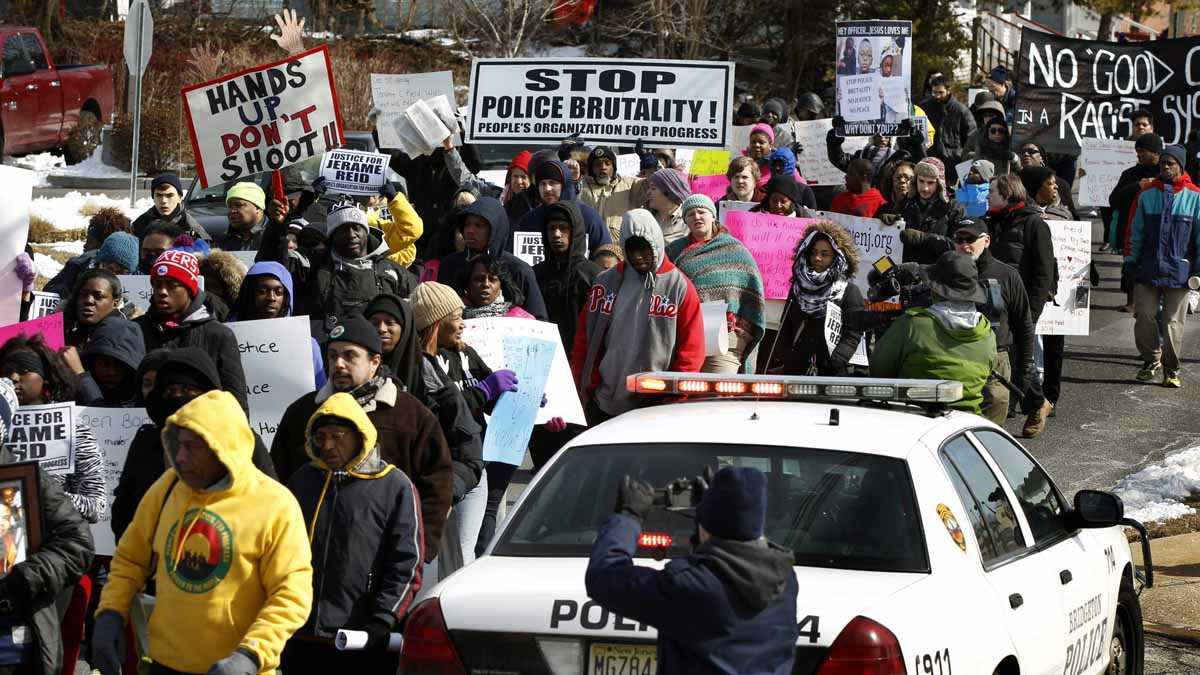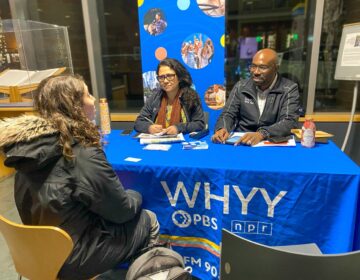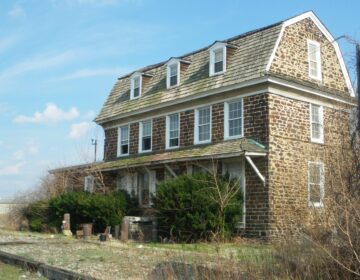Explainer: What happens when police in New Jersey are involved in a shooting

Demonstrators hold signs and shout as they march in protest of a fatal police shooting February 2015 in Bridgeton, NJ.(AP Photo/Mel Evans)
*State officials are investigating a July 29 shooting in Sparta in which an off-duty state trooper fired three shots into a fleeing car. No one was hurt, but because a state police officer was involved, the attorney general’s Shooting Response Team is required to conduct a probe.
Sparta is the fourth probe being conducted by the SRT this year – including two into fatal shootings by state and county officers. It comes on the heels of dozens of high-profile police shootings across the country that have raised questions about whether local or county law enforcement should be investigating when local or county police fire their weapons.
The SRT was created in 2000 to investigate shootings that involved county or state law-enforcement personnel. Over the past four years, according to the attorney general’s office, about one-sixth of all “police-involved” shootings have been investigated by the SRT, according to the attorney general’s office.
Why was the SRT created? The Shooting Response Team was created by state attorney general John Farmer in response to a 1999 consent decree with the U.S. Department of Justice that required New Jersey to put in place a system in which federal officials are called in when state troopers were under investigation for misconduct or constitutional violations, according to Directive 2000-2. As part of the new notification system, Farmer also ordered new reporting rules for officer-involved shootings and the creation of a new investigative unit.
How does the SRT work? Shootings by any law-enforcement official in the state are required to be reported to the Division of Criminal Justice within 24 hours. Local shootings are investigated by the county prosecutor’s offices, though the state can step in and take over investigations when there are conflicts, according to the Farmer directive. For instance, the Monmouth County prosecutor’s office will investigate the shooting death of Tamara Seidle, allegedly by her husband, Neptune Police Sgt. Philip Seidle.
All shootings involving state and county law enforcement are referred to the Shooting Response Team.
Who makes up the SRT? SRT members include investigators from the Division of Criminal Justice and the state police Major Crimes Unit and deputy attorneys general.
How many shootings has the SRT investigated since 2005? There have been 53 shootings investigated by the Shooting Response Team since 2005, or about five per year.
The SRT investigated nine shootings in 2011 and seven in 2013, its two busiest years, according to figures provided by the attorney general’s office.
How many cases are referred to a state grand jury and, ultimately, lead to indictment of law enforcement officers? Of the 53 cases since 2005, 20 were presented to state grand juries, with two resulting in indictments. The rest are considered justified shootings, according to the attorney general’s office.
Three of this year’s cases remain under investigation. In a fourth, the SRT charged an alleged drug dealer with second-degree attempted murder and other offenses.
How many police involved shootings have taken place in New Jersey so far this year? According to state police statistics provided by the attorney general’s office, there have been 16 shootings by police officers this year.
How about in previous years? There were 31 in 2012, 47 in 2013, and 33 in 2014.
How do New Jersey’s 2015 numbers compare with other states? National reporting is unreliable, according to press reports. The Washington Post, for instance, reported in May that there had been nearly 400 shootings nationally, which “is more than twice the rate of fatal police shootings tallied by the federal government over the past decade,” though law enforcement admits the count is incomplete.
Where did the four shootings under investigation by the SRT this year take place?Sparta, Middletown, Union, and Sayreville.
Who were the shooters? State troopers were involved in Sparta and Union, while a Monmouth County Emergency Response officer and a Middlesex County drug task force officer were involved in the other shootings.
What were the race, gender and ethnicities of the victims and officers? The attorney general’s office did not provide an answer to this question.
What happened in Sparta? According to a press release from the attorney general’s office, three young men knocked on the front door of the trooper’s house between 1:30 and 2 a.m., waking the trooper and his wife. The trooper answered the door, armed with his personal handgun. A “verbal exchange through the door” followed, the release said, and the men ran off. The trooper identified himself and chased the men, who attempted to drive off. They turned around in a cul-de-sac at the end of the street and headed back past the trooper’s house.
The trooper then “entered the street in an attempt to stop the vehicle,” the release said. He fired three shots when the car didn’t stop, striking a front wheel and disabling the car. The men fled the car, one calling his mother and police, the release said. The men were apprehended by police a short while later. No criminal charges have been filed and the “preliminary investigation indicates that the young men were in the area to attend a party and mistakenly believed the trooper’s home was the house of a friend.”
The Shooting Response Team was called in because a state trooper was involved.
What happened in Middletown? The Monmouth County Emergency Response Team was called in after negotiations failed to end a hostage crisis on May 27. A release from the attorney general’s office said that Scott McAllister, 39, was holding his 13-month-old son hostage after a domestic dispute. McAllister’s wife fled the house, reporting that McAllister was intoxicated and had beaten her, according to the release. McAllister was allegedly armed with a knife.
After about five hours of negotiations, officers forcibly entered the house and McAllister was shot. The child was unharmed.
What happened in Union? On April 22, a state police theft unit attempted to arrest a man alleged to have carjacked a black Jeep Cherokee in Bloomfield the week before. An attorney general press release said troopers were conducting surveillance when they saw Daniel Wolfe, 35, the suspected carjacker, get out of a pickup truck and into the Jeep. Officers attempted to make the arrest, according to the release, but Wolfe drove the Jeep in reverse, rammed a parked car and then drove at a trooper. The trooper fired multiple shots, striking Wolfe in the shoulder and chest, according to the release, and the Jeep struck another parked car.
Officers pulled Wolfe from the car “and provided him with medical aid,” the release said. Wolfe was pronounced dead at University Hospital in Newark.
What happened in Sayreville? A Perth Amboy police officer assigned to a county drug task force fired his rifle at a fleeing suspect January 23 after an undercover drug sting failed. Officers had been waiting for the suspect, Isaiah D. Roberts, 38, outside a Rite Aid Pharmacy as part of an undercover heroin purchase, according to an attorney general press release. Roberts allegedly identified the officers and attempted to turn his car and flee the parking lot. The release says he struck an unmarked police car, which caused the officer to fire his rifle. The shots missed, but Roberts struck three other police vehicles and was arrested, the release said.
Roberts, according to the release, was in possession of 10 bundles of approximately 50 single-dose glassine folds of heroin. The SRT charged Roberts with second-degree attempted murder, second-degree aggravated assault, second-degree eluding police, and third-degree possession of a weapon for an unlawful purpose (his vehicle).
________________________________________________________
NJ Spotlight, an independent online news service on issues critical to New Jersey, makes its in-depth reporting available to NewsWorks.
WHYY is your source for fact-based, in-depth journalism and information. As a nonprofit organization, we rely on financial support from readers like you. Please give today.




